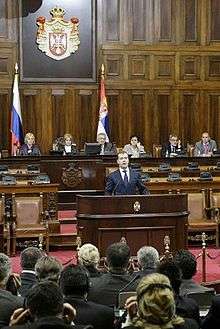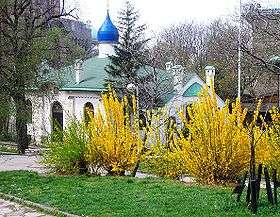Russophilia

.jpg)
Russophilia (literally love of Russia or Russians) is individual or collective admiration and fond of Russia, Russian history and Russian culture, especially someone who is sympathetic to the political system and customs of the former Soviet Union or who exhibits Russian nationalism in spite of not even being either an ethnic Russian or a Russian citizen.
Russophilia in Europe
Russophilia in other European countries may be based on stereotypes produced by mass culture ("traditional Russian hospitality", "Russian tenderness" etc.), as well as on in-depth study of Russian mentality, as expressed, e.g., by American author Robert Alexander: "I love Russians for their dramatic, emotional nature. They're not afraid to love, not afraid to get hurt, not afraid to exaggerate or act impulsively."[1]
In October 2004, the International Gallup Organization announced the results of its poll,[2] according to which approximately 20% of the residents of Western Europe viewed Russia positively, with the most positive view coming from Iceland, Germany, Greece, and Britain. The percentage of respondents expressing a positive attitude towards Russia was 9% in Finland, Turkey, and Japan, 38% in Lithuania, 36% in Latvia, and 34% in Estonia. Estonia and especially Latvia have a large number of ethnic Russians, which likely affected the result.
Russophilia in Serbia and Montenegro
In Serbia and Montenegro, Russophilia was frequently closely tied with Orthodoxy, Pan-Slavism and the perceived threat of pangermanism.
Russophilia in Serbia
Russia is hugely popular in Serbia, and Serbs have always traditionally seen Russia as a close ally due to shared Slavic culture and Orthodox faith.[3] In Serbia and Montenegro, whose nations are both predominately Eastern Orthodox, the faith expressed by a vast majority of Russians, there was no Soviet influence and Russians were always seen as friendly brotherly people. About 83% of Serbs see Russia as their first ally on the international scene. In both Serbia and Montenegro, there are neighbourhoods, streets, buildings and statues named after something Russian. In Serbia there is the Russian Centre of Science and Culture and Hotel Moskva.

 Russian Orthodox Church in Tašmajdan park, Belgrade
Russian Orthodox Church in Tašmajdan park, Belgrade Vladimir Putin at Belgrade's Red Star Stadium in March 2011
Vladimir Putin at Belgrade's Red Star Stadium in March 2011 Vladimir Putin in front of Cathedral of Saint Sava
Vladimir Putin in front of Cathedral of Saint Sava
Russophilia in Montenegro
Montenegro is also an Eastern Orthodox and Slavic country. There is the Moscow Bridge[4] in Podgorica, and a statue of Russian singer and actor Vladimir Vysotsky next to the bridge.
Russophilia in Ukraine
Following Ukrainian independence in 1991 Ukrainians, mostly in the east and south of the country, voted to a see a more Russophile attitude of the government, ranging from closer economic partnership to full national union.[5] Since the 2014 Russian military intervention in Ukraine the overall attitude of Ukrainians towards Russia and Russians has become much more negative.[6]
Western Ukraine
Russophilia (Moscophilia, Ukrainian: москвофільство, moskvofil’stvo) was a linguistic, literary and socio-political movement in the Western Ukrainian territories of Galicia, Transcarpathia, and Bukovyna in the 18th - 20th centuries. Proponents of this movement believed in linguistic, cultural, social union with Russian people and later in state union with Russia. Among the causes for the emergence of this phenomenon were the absence of Ukrainian statehood, centuries of foreign oppression, fragmented Ukrainian territories and dispersed population, as well as the defection of national elite to neighbouring cultures and a weak sense of national identity.
Russophile Movement in Transcarpathia
The first instances of Russophilia in Transcarpathia date back as far as late 18th early 19th centuries when several famous Russians with ties to the government and the court of the tsar settled there. Such famous scientists and social activists as I. Orlai, M. Baludiansky, P. Lodiy and others lived in Transcarpathia and maintained close ties with the country of their birth and thereby promoted interest towards Russia, especially towards its cultural life, its language and literature.
Russophile Movement in Galicia and Bukovyna
When Galicia and Bukovyna were incorporated into the Habsburg Empire in 1772 the Austrian government treated the Ukrainian population of these territories with suspicion as it was afraid it was susceptible to Russian influence due to the closeness of Ukrainian and Russian languages and cultures. This mistrust of the authorities was cultivated by influential Polish politicians and activists in an effort to forestall the growth of national consciousness on territories where Poles traditionally had influence. Any attempt at cultural revival was met with hostility from the Austrian government which regarded them as an influence from Moscow. In spite of this atmosphere of mistrust and suspicion the first educational establishment "The Fellowship of Priests" was founded in Przemyśl. Metropolitan M. Levytsky began to introduce the Ruthenian language in elementary schools, developed grammar books, insisted on instruction in University in Ruthenian and founded "Ruska Troyka" Society. The Lemko-Rusyn Republic, after World War I, attempted to join Lemko territories to Russia, and later to similar areas of the newly formed Czechoslovakia.
Notable Russophiles
- Petar II Petrović-Njegoš, Montenegrin Serb prince-bishop.
- Gérard Depardieu, French actor.
- Miodrag Božović, Montenegrin football coach.[7]
- Duško Vujošević, Montenegrin basketball coach.[8]
- Tim Key, comedian and poet.[9]
- Zehava Gal-On, Israeli politician.
- Ayman Odeh, Israeli politician.
- Sukarno, 1st President of Indonesia.
- Viktor Orbán, prime minister of Hungary
- Matteo Salvini, Deputy Prime Minister of Italy
- Gerhard Schröder, Chancellor of Germany
- Slobodan Milošević, 3rd President of the Federal Republic of Yugoslavia
Pro-Russian political parties
- Alliance of Patriots of Georgia [10]
- Bulgarian Socialist Party [11]
- Party of Socialists (Moldova)[12]
- Prosperous Armenia [13]
- Progressive Socialist Party of Ukraine[14]
- National Rally (France)[15]
- Freedom Party of Austria[16]
- Five Star Movement[17]
- Lega Nord (Italy)[18][19]
- CasaPound Italy[20][21]
- Alternative for Germany[22]
- Human Shield[17]
- Serbian Radical Party[23]
- Communist Party of Bohemia and Moravia[24]
- Latvian Russian Union[25]
- Electoral Action of Poles in Lithuania – Christian Families Alliance[26]
- Kotleba – People's Party Our Slovakia[27]
- Opposition Bloc
- Party of Regions
- Labour Party (Lithuania)[28]
- Order and Justice(Lithuania)[29]
- Social Democratic Party "Harmony"(Latvia)[30]
See also
References
- ↑ An Interview with Robert Alexander
- ↑ Helsingin Sanomat, October 11, 2004, International poll: Anti-Russian sentiment runs very strong in Finland. Only Kosovo has more negative attitude
- ↑ Why are Russians so popular in Serbia?
- ↑ Moscow bridge in Podgorica
- ↑ Rapawy, Stephen (1997). Ethnic Reidentification in Ukraine (page 17) (PDF). Washington, D.C.: United States Census Bureau, International Programs Center. Archived from the original (PDF) on 19 October 2012.
- ↑ How Ukraine views Russia and the West, Brookings Institution (October 18, 2017)
- ↑ "Ja sam rusofil! Rusija je moja druga zemlja!". Kurir.
- ↑ "RUSOFIL VUJOŠEVIĆ: Kačket menjam, ali ostajem isti!".
- ↑ "Tim Key Delves Into Daniil Kharms And That's All". Radio Times.
- ↑ http://georgiatoday.ge/news/4985/Pro-Russian-Alliance-of-Patriots-Demand-More-Seats-in-Parliament
- ↑ Borisov's pro-EU party beats Socialists in Bulgaria's snap election 26 March 2017 The Guardian
- ↑ Moldova election: Pro-EU parties edge pro-Russian rivals BBC News 1 December 2014
- ↑ http://www.eurasianet.org/departments/insight/articles/eav051007b.shtml
- ↑ https://regnum.ru/news/polit/1429291.html
- ↑ Foer, Franklin. "It's Putin's World". The Atlantic. Retrieved 2017-05-09.
- ↑ "Austrian far right signs deal with Putin's party, touts Trump ties". Reuters. 2016-12-19. Retrieved 2017-05-09.
- 1 2 "Putin's friends in Europe". European Council on Foreign Relations. 19 October 2016. Retrieved 19 July 2018.
- ↑ "L'accordo tra la Lega Nord e il partito di Putin". il Post. March 7, 2017.
- ↑ Matteo Carnieletto; Elena Barlozzari (July 13, 2017). "Ecco l'accordo tra Lega Nord e Russia Unita". il Giornale.
- ↑ "CasaPound, l'orgoglio di Di Stefano: "Siamo fascisti, ammiro Putin"". Libero. 16 November 2017.
- ↑ Leonardo Bianchi (March 2, 2015). "Ho passato un pomeriggio con la Lega Nord e CasaPound a Roma". Vice.
- ↑ http://intersectionproject.eu/article/russia-europe/whither-alternative-germany
- ↑ https://www.irishtimes.com/news/world/europe/ultranationalism-and-russia-colour-serbia-s-election-1.2616413?mode=amp
- ↑ https://www.channelnewsasia.com/news/world/czech-parties-edge-towards-coalition-deal-after-months-of-stalemate-10435088
- ↑ Schulze, Jennie L. (2018). Strategic Frames: Europe, Russia, and Minority Inclusion in Estonia and Latvia. Pittsburgh: University of Pittsburgh Press. ISBN 978-0-82296-511-4.
In 2014, the party changed its name to the Latvian Russian Union, and adopted a pro-Russia stance by signing a cooperation agreement with the pro-Russia regional party Russian Unity in Crimea in order to “strengthen the unity of the Russian World.”
- ↑ "Stirring the pot". The Economist. 3 March 2015. Retrieved 14 April 2017.
- ↑ . "NAKA veriffied Kotleba because of money from Russia."
- ↑ http://www.sunjournal.com/new-pro-russia-party-stumbles-lithuanian-elections/
- ↑ http://www.demsoc.org/2014/05/01/order-and-justice/
- ↑ https://www.bbc.com/news/world-europe-45774578
- Orest Subtelny. Ukraine. A history. University of Toronto Press. 1994. ISBN 0-8020-0591-8.